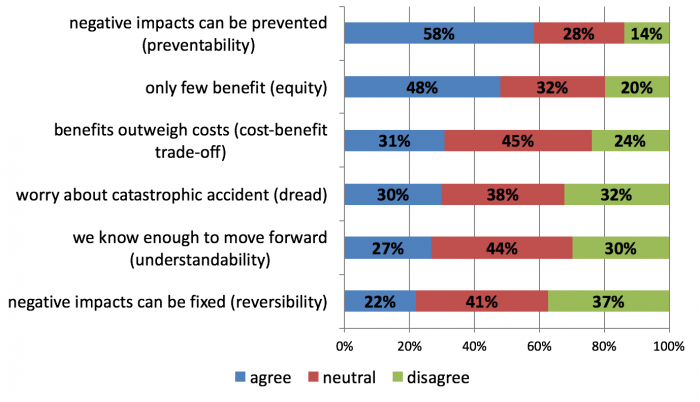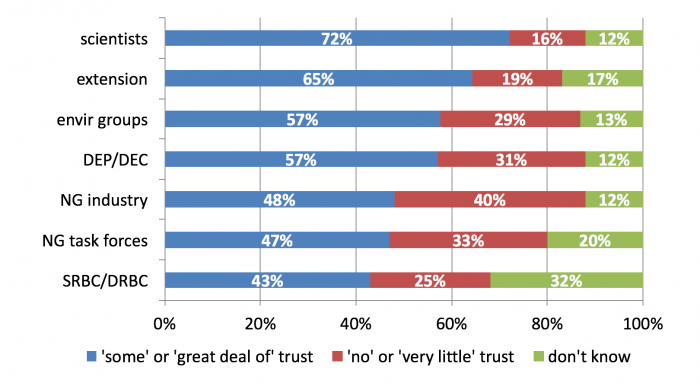Risk Perception and Institutional Trust
Academic discourses on risk perception have traditionally focused on the ignorance or irrationality of the public, assuming that the public’s concerns stem from insufficient or inaccurate information and that this can be reversed by education. Sociological studies have been among a group of research that suggests otherwise. Studies have shown that in many cases, an individual’s perception of risk may increase as they gather more information on a specific topic. Moreover, technical information is just one factor in a long list that together builds an individual’s perception of risk.
An individual’s perception of risk is not a scientific calculation, but a human decision that takes into account factors such as previous experiences, emotions, values, culture, and worldviews. Risk perception is affected by the content and level of information received sociodemographic attributes such as gender and age, as well as personal values. Familiarity with the action or technology being considered, how it is portrayed in the media, and visions of what could go wrong all play a role in an individual’s perception of risk (Freudenburg 1993).
The figure presented below shows data collected from a 2009-2010 6,000-household survey administered by mail to households in New York and Pennsylvania (Willits et al 2010). As the graph illustrates, more than half of respondents in a recent survey on community satisfaction and change in the Marcellus Shale region felt that potential negative impacts could be prevented, and just slightly less than half (48%) were concerned that benefits would accrue to only a few individuals. Respondents were nearly evenly split in their level of worry about a catastrophic accident, while about a third felt that we did not know enough to move forward with Marcellus Shale development.

- negative impacts can be prevented (preventability):
- 58% agree
- 28% neutral
- 14% disagree
- only few benefit (equity):
- 48% agree
- 32% neutral
- 20% disagree
- benefits outweigh costs (cost-benefit trade-off):
- 31% agree
- 45% neutral
- 24% disagree
- worry about catastrophic accident (dread):
- 30% agree
- 38% neutral
- 32% disagree
- we know enough to move forward (understandability):
- 27% agree
- 44% neutral
- 30% disagree
- negative impacts can be fixed (reversibility):
- 22% agree
- 41% neutral
- 37% disagree
When applying risk perception to the topic of shale gas development, it’s important to consider the role of institutions in an individual’s perception of risks. Institutional failures and their associated consequences – caused by technological failings, human error, or institutional self-interest – can lead to an individual’s distrust in various institutions, such as government agencies, regulatory bodies, or industry. Level of trust, in the ability of institutions to manage risks, or in their willingness to fulfill their responsibilities, factors into the weighing of risks done by individuals.
The figure below illustrates the level of trust that respondents have in a series of organizations and agencies that have been involved with Marcellus Shale issues. Respondents had relatively high trust in scientists and extension, followed by environmental groups and state regulatory agencies. Respondents were somewhat split about trusting the natural gas industry, with about half trusting and 40% distrusting.

- scientists:
- 72% 'some' or 'great deal of' trust
- 16% 'no' or very little' trust
- 12% don't know
- extension:
- 65% 'some' or 'great deal of' trust
- 19% 'no' or very little' trust
- 17% don't know
- envir groups:
- 57% 'some' or 'great deal of' trust
- 29% 'no' or very little' trust
- 13% don't know
- DEP/DEC:
- 57% 'some' or 'great deal of' trust
- 31% 'no' or very little' trust
- 12% don't know
- NG industry:
- 48% 'some' or 'great deal of' trust
- 33% 'no' or very little' trust
- 20% don't know
- NG task forces:
- 47% 'some' or 'great deal of' trust
- 33% 'no' or very little' trust
- 20% don't know
- SRBC/DRBC:
- 43% 'some' or 'great deal of' trust
- 25% 'no' or very little' trust
- 32% don't know